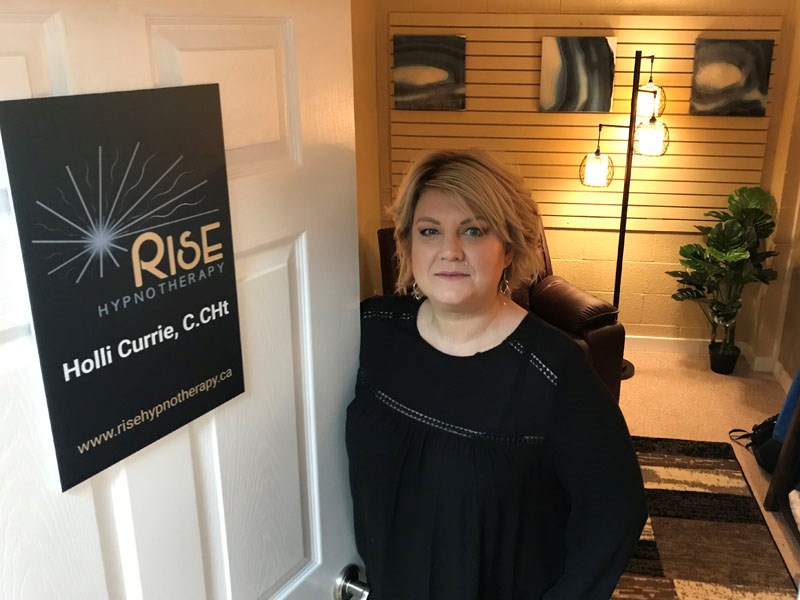A richer, more fulfilling life is just around the corner, says licensed hypnotherapist Holli Currie. And with so many people looking for positive changes this time of year, now is the time to take the first step, she adds.
Holli has recently opened her practice, Rise Hypnotherapy, in the Marine Medical Building and is accepting new clients. She received her training at the Canadian College of Advanced Hypnosis and Hypnotherapy (CCAHH) in Courtenay and graduated as a Certified Clinical Hypnotherapist (C.CHt).
Rise Hypnotherapy is the only practice in town that specializes solely in hypnosis, says Holli.
Hypnotherapy, for the most part, is not well understood by the general public, she adds.
Many misconceptions float around of what hypnosis is and what it is not; most can be traced back to the imaginations of television and movie writers, says Holli. For one, hypnosis is not mind control.
“The biggest thing is that most people think I have control over you,” says Holli. “While you're in hypnosis you can get up and walk away if you want to. I can't hypnotize anyone who does not want to be hypnotized, but everybody can be if they want.”
Hypnosis is a naturally occurring state of focused concentration and relaxation that everyone enters every night just before they fall asleep, she explains. In this state, the mind becomes open to new ideas and suggestions, changing the way a person thinks, feels, and ultimately, the way he or she behaves, she says.
“By turning your attention inward, like guided meditation, we can find and utilize your own resources to create change, or regain control of certain areas of your life,” she adds.
The mind is split into two parts, the conscious part (what someone is aware of right now) and the unconscious part (what someone is unaware of that contributes to their decision-making process), explains Hollie. The unconscious mind is comprised of everything a person has learned from the day they were born: their upbringing, education, belief systems, values and experiences.
All of this works together very quickly when someone is making a decision and informs them whether they want to do something or avoid it, or whether they find the activity pleasant or scary, she adds. An instructive way to think of the mind with its two parts is to use the example of an iceberg floating in the ocean, says Holli. The conscious mind, which makes up a very small part of the mind, is comparable to the tip of the iceberg seen above the ocean's surface. The unconscious mind, by contrast, is like the rest of the submerged iceberg: vast in size. By changing a person's unconscious mind, conscious reactions and behaviours can be altered, she adds.
Hypnosis can be effective for many issues, including anxiety, depression, fears and phobias, grief, sports performance, quitting bad habits, and more.
“It's also a great accompaniment to other treatments such as chemotherapy, medications or physiotherapy,” says Holli.
In most cases, hypnotherapy works faster and is more effective than behavioural therapy and psychoanalysis, she adds. According to research from clinical psychologist Dr. Alfred A. Barrios, he found that 93 per cent of clients recovered after six sessions of hypnotherapy, whereas 72 per cent of clients found success after 22 sessions of cognitive behavioral therapy and 38 per cent of clients found success after 600 sessions of psychoanalysis.
Although many clients reach their goals after one or two sessions, Holli finds most will need up to four or even six sessions, depending on the person and the issue they’re dealing with. She offers potential clients a free 15-minute consultation, either in person or by phone, to determine if hypnotherapy is appropriate.
A portion of the cost of seeing a hypnotherapist is often covered by extended health plans and ICBC and WorkSafeBC will now cover its cost for issues such as pain management and PTSD, says Holli.
More information can be found online at risehypnotherapy.ca or by calling 604. 414.3835. Readers can also search for Rise Hypnotherapy on Facebook.



